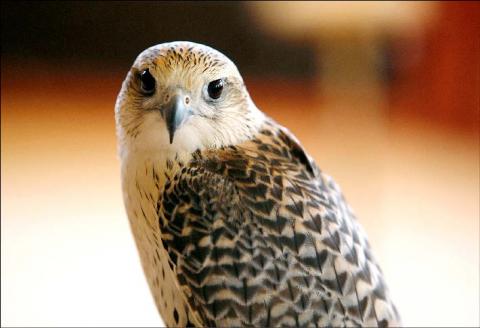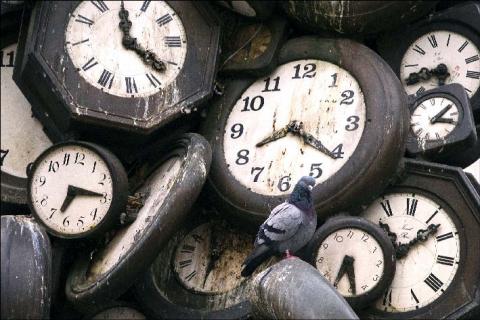Falcons, long used for hunting in the Middle East and a prized status symbol, are now being adapted for a more mundane problem: pest control.
The appearance of gleaming steel and glass high-rise buildings in the United Arab Emirates (UAE) of Abu Dhabi and Dubai where only desert existed a few decades ago, coupled with a long tradition of breeding birds of prey, has made falcon-based pest control a thriving business, as building owners try to prevent pigeons from nesting and relieving themselves on their flawless facades.
“Pigeons are flying rats, they will come in and just nest,” said Richard Ellis, a falconer at Royal Shaheen Events.

Photo: Reuters
“It is an ecological way to use falcons to control the populations of pigeons,” he said as he placed hoods over the birds’ heads as part of preparations to transport them to another pigeon-infested zone for a fresh hunt.
Royal Shaheen, a falconry enterprise based in the emirate of Ras al-Khaimah, makes up to half of its revenues from pest control on Sir Bani Yas island, a tourist destination where imported wild animals roam in a safari park.
Falcons, some able to dive at speeds of more than 320kph, do not kill the pigeons, but are used to scare them away from public places.

Photo: AFP
However, still not everyone approves of using a bird that is so widely revered in the Persian Gulf for such workmanlike purposes.
Centuries ago in the region, Bedouin tribesmen used falcons — saqr in Arabic — to hunt for meat in the winter, when the only food available were dates, camel milk and bread. It is the national symbol of the seven United Arab Emirates, featured on road signs and the national currency.
Emirati falconer Mohammed Salem al-Kabi, who keeps 17 falcons in the desert oasis town of al-Ain, said using falcons as pest controllers was a travesty for such a majestic bird, which also does not like this kind of work.
“There are more efficient ways such as pills to make pigeons drowsy or using ultrasound to chase them away,” al-Kabi said, gathered among his friends in an air-conditioned tent with a flat screen TV on the wall showing falcons hunting.
However, around the world where many city squares such as the Piazza San Marco in Venice or Trafalgar Square in London are famous for their large pigeon populations, falcons have already been deployed to control unwanted birds.
WORLDWIDE USE
“About 25 companies in Britain use falcons for pest control and there are many all over the world, so clearly it works and is cost effective,” said Nick Fox, Director at International Wildlife Consultants Limited in Wales.
Fox said the British Houses of Parliament and a stadium in Cardiff were also protected by trained hawks.
Falcons have also been used at the tennis courts of Wimbledon to keep the world championships pigeon-free and in the past at New York’s JFK Airport to scare off gulls and geese from entering the airspace and prevent bird strikes — where birds are sucked into jet engines.
David Stead, owner of rival al-Hurr Falconry Services in the UAE, said the falcon business was flying.
“The market is massive, there is space for more. We don’t tread on each other’s toes,” Stead said.
“We fly at all their hotels, Burj al-Arab, Emirates Towers, Madinat Jumeirah,” he said of his top client, luxury hotelier Jumeirah Group in Dubai.
In the UAE, Ras al-Khaimah International Airport, the University of al-Ain, as well as hotels in Fujairah have all expressed interest in employing falcons, Royal Shaheen director Peter Bergh said.
For Bergh’s 40 falcons, fees range from 40,000 dirhams (US$10,890) up to 70,000 dirhams a month.
“Here the problem gets attention because of the glossy, shiny buildings which they spoil,” Bergh said.
Regardless the opposition to pest control, falcon-breeding and trading in the desert oil producer is on the rise.
EXPANDING DEMAND
“Falconry is now expanding. It used to be only for rich people and sheikhs to hunt,” said Abdulla Lootah, an owner of a farm in Dubai, which breeds about 50 to 60 falcons each year.
“Because falcons are easy to get and they are everywhere, everybody wants to have one. That’s why we started this business,” he said.
About 18,000 falcons are currently registered in the UAE, said Abdulrab al-Hamiri, a deputy manager at Abu Dhabi’s Environment Agency.
Every year, about 800 falconers from the Persian Gulf, including about 300 from the UAE, gather for speed races, though only royalty and the rich can afford to go on grand hunting expeditions abroad in countries such as Russia and Kazakhstan where annual permits can cost up to US$300,000.
“It is really expensive. You have to rent land first and have a permit for hunting,” said Lootah, who keeps about 120 breeding falcons in air-conditioned spaces as the mercury climbs well over 40?C in the summer.
However, the increasing interest in using the birds for business as well as a hobby has created another problem. Some falconers prefer wild falcons to birds raised in captivity and that has boosted legal and illegal trade in the species.
“With the breakup of the USSR in 1993, large tracts of Asia have been opened up to trapping, some of which is through legal quotas such as Mongolia, but some is illegal,” Fox said.
“China and Kazakhstan used to have an export quota, but have stopped trading in recent years. Lack of legal sources has sent much of it underground and so it continues illegally,” he said.
The hunting of wild animals including falcons in the UAE was banned in 1978, Hamiri said, and the declaration of a new law in 2002 to regulate the trade of endangered species and falcons has dramatically decreased the illegal trade.
“In regard to the UAE, we have increased efforts to combat smuggling and as per our records we intercept a few individuals annually mainly at airports and land border crossings,” Hamiri said. “In some cases it’s live falcons or mounted specimens ... Sedating falcons and hiding them in a car.”
Every season about 600 falcons are estimated to arrive in the UAE, one of the biggest markets in the Persian Gulf, prompting airlines to even issue “falcon passports” to regulate transport.
These days, falconers are willing to pay up to US$270,000 for the rare hunting and sports birds, well up from about US$30 in the late 1940s.
“It is expensive in value, but it is precious to our hearts,” said al-Kabi, who keeps a perch for favorite falcons in his bedroom.

TECH TITAN: Pandemic-era demand for semiconductors turbocharged the nation’s GDP per capita to surpass South Korea’s, but it still remains half that of Singapore Taiwan is set to surpass South Korea this year in terms of wealth for the first time in more than two decades, marking a shift in Asia’s economic ranks made possible by the ascent of Taiwan Semiconductor Manufacturing Co (TSMC, 台積電). According to the latest forecasts released on Thursday by the central bank, Taiwan’s GDP is expected to expand 4.55 percent this year, a further upward revision from the 4.45 percent estimate made by the statistics bureau last month. The growth trajectory puts Taiwan on track to exceed South Korea’s GDP per capita — a key measure of living standards — a

Samsung Electronics Co shares jumped 4.47 percent yesterday after reports it has won approval from Nvidia Corp for the use of advanced high-bandwidth memory (HBM) chips, which marks a breakthrough for the South Korean technology leader. The stock closed at 83,500 won in Seoul, the highest since July 31 last year. Yesterday’s gain comes after local media, including the Korea Economic Daily, reported that Samsung’s 12-layer HBM3E product recently passed Nvidia’s qualification tests. That clears the components for use in the artificial intelligence (AI) accelerators essential to the training of AI models from ChatGPT to DeepSeek (深度求索), and finally allows Samsung

READY TO HELP: Should TSMC require assistance, the government would fully cooperate in helping to speed up the establishment of the Chiayi plant, an official said Taiwan Semiconductor Manufacturing Co (TSMC, 台積電) yesterday said its investment plans in Taiwan are “unchanged” amid speculation that the chipmaker might have suspended construction work on its second chip packaging plant in Chiayi County and plans to move equipment arranged for the plant to the US. The Chinese-language Economic Daily News reported earlier yesterday that TSMC had halted the construction of the chip packaging plant, which was scheduled to be completed next year and begin mass production in 2028. TSMC did not directly address whether construction of the plant had halted, but said its investment plans in Taiwan remain “unchanged.” The chipmaker started

Taiwan has imposed restrictions on the export of chips to South Africa over national security concerns, taking the unusual step of using its dominance of chip markets to pressure a country that is closely allied with China. Taiwan requires preapproval for the bulk of chips sold to the African nation, the International Trade Administration said in a statement. The decision emerged after Pretoria tried to downgrade Taipei’s representative office and force its move to Johannesburg from Pretoria, the Ministry of Foreign Affairs has said. The move reflects Taiwan’s economic clout and a growing frustration with getting sidelined by Beijing in the diplomatic community. Taiwan